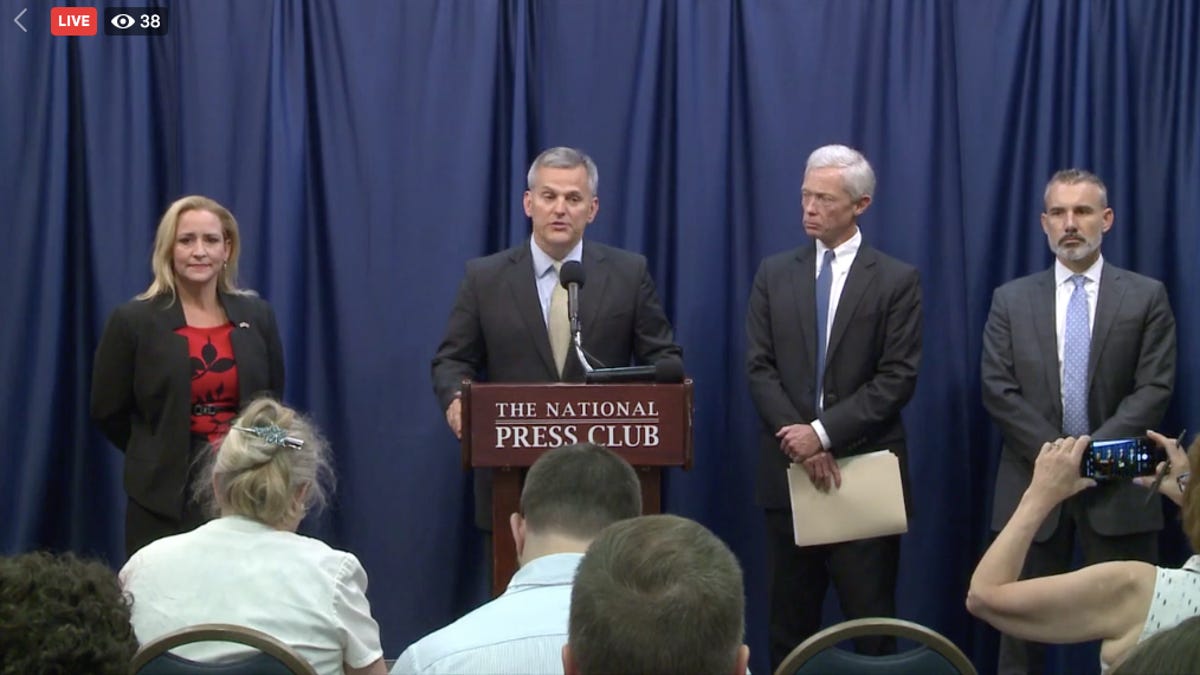States strike deal with phone companies to combat illegal robocalls
Attorneys general from across the country have agreed with 12 phone companies to a set of principles to help prevent illegal robocalls and to find those perpetrating them.

(From left) Attorneys General Leslie Rutledge of Arkansas, Josh Stein of North Carolina and Gordon MacDonald of New Hampshire join Patrick Halley, a senior vice president at US Telecom, at a press conference in Washington, DC, to unveil a new agreement with 12 phone companies to help stop illegal robocalls.
States are banding together with large telecom companies to combat robocalls. Twelve of the nation's largest telephone companies struck an agreement Thursday with the attorneys general of all 50 states to help prevent and block robocalls.
Under the agreement, the companies have promised to implement the SHAKEN/STIR technology, which would validate that calls are originating from where they claim to be coming from and would allow for faster tracing of illegal calls to find out who's responsible for them, North Carolina State Attorney General Josh Stein said during a press conference announcing the agreement.
The companies also promised to work with state law enforcement to investigate the origins of illegal robocalls, including confirming the identities of their commercial customers suspected of making such calls. The companies will also make free call-blocking technology available to consumers.
Stein said the partnership with the phone companies is just the beginning and isn't a silver bullet in stopping these unwanted and annoying calls.
"Thanks to these prevention principles, our phones will ring less often," he said. "But unfortunately there will always be bad actors no matter how well we try to prevent these calls. Some will get through and that's why enforcement is such a critical part of what we're doing today."
Still, he said that "by shining a light on these robocallers, we will be able to aggressively enforce the law against the scofflaws and hold them accountable."
The agreement is voluntary, and there's no deadline for compliance. Smaller phone companies haven't yet signed on to the agreement.
The larger carriers that've signed on say they're committed to working with the states and federal government to end the scourge of illegal robocalls.
"We're in the midst of an ongoing battle with those responsible for sending annoying and often deceptive spam calls to our customers, and we're determined to fight this battle," Kathy Grillo, a senior vice president for government affairs at Verizon, said in a statement. "It's imperative that we stand together on a common set of goals that include stopping callers from hiding their identities, working with other carriers on efforts to trace back illegal calls to the source, and keeping the originators from sending robocalls in the first place."
Americans received nearly 50 billion robocalls last year, according to a Federal Communications Commission report released in February. Nearly 50% of those calls were from scammers. The report also highlighted that the number of complaints about illegal robocalls has been increasing, jumping from 172,000 complaints in 2015 to 232,000 complaints in 2018.
Robocalls use autodialers and recorded messages to make millions of phone calls. Often the numbers that show up in caller ID appear to belong to friends or neighbors, when they're actually "spoofed." These calls hide the real number to trick people into answering the call.
FCC Chairman Ajit Pai applauded the phone companies for working with states to stop illegal robocalls, and he said the principles align with what the FCC has been doing.
"Few things can bring together policy leaders across the political spectrum like the fight against unwanted robocalls," Pai said. " I salute today's bipartisan, nationwide effort to encourage best practices for combating robocalls and spoofing and am pleased that several voice service providers have agreed to abide by them."
The FCC has adopted some policies to reduce the number of calls people get. The agency has changed rules to allow phone companies to block suspected robocalls by default, and it's closed loopholes to go after illegal robocallers overseas.
Congress has also stepped in to ensure the agency has what it needs to give its policies teeth. In May the Senate passed the Telephone Robocall Abuse Criminal Enforcement and Deterrence (TRACED) Act with more than 80 co-sponsors. The bill is designed to improve enforcement policies, such as criminalizing illegal robocalling, and also improve coordination between agencies policing robocalls. It also requires phone companies to use the SHAKEN/STIR protocol.

